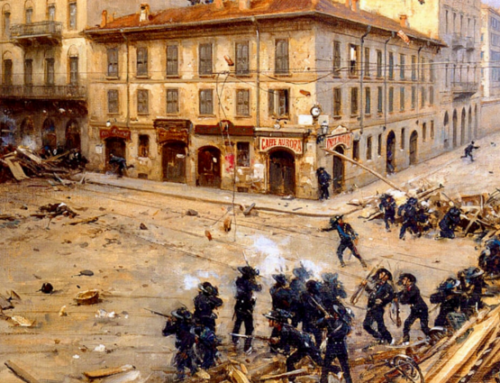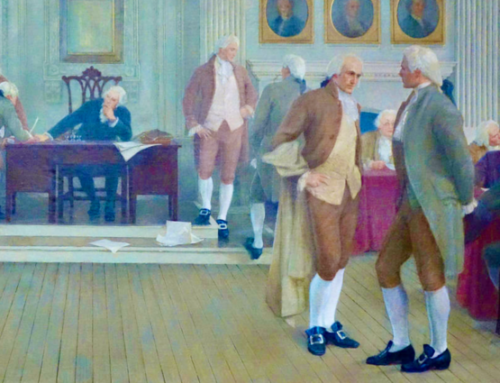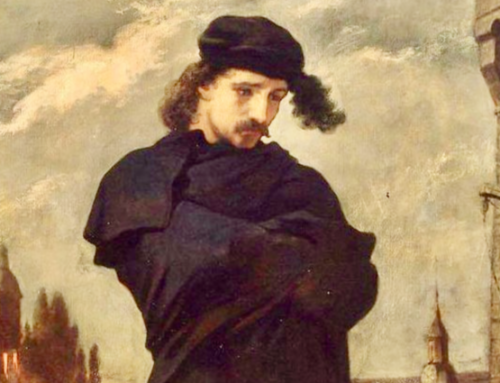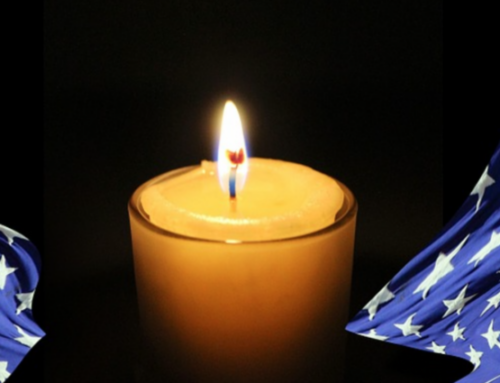Whether or not President Trump is successful with a principled nationalistic agenda or with a more pragmatic one, more traditionally-oriented conservative intellectuals must do some serious thinking, either acceding to nationalism or pragmatism or finding a new story…
 Donald Trump is nothing if he is not forthright.
Donald Trump is nothing if he is not forthright.
In his Inaugural Address, the President could not have been clearer: “From this day forward, it’s going to be only America first, America first.” “American hands, American labor.” “Buy American and hire Americans.” “A new national pride will stir ourselves, lift our sights and heal our divisions.” His White House intellectual confidant Stephen Bannon called the address an “unvarnished statement of the basic principles of his populist and kind of nationalist movement.”
So he is a nationalist. But before falling for the ravings of ideologists on the left, more traditionalist conservatives must remember that nationalism can go to extremes as with a Napoleon or worse but there are more moderate forms too. Businessman Silvio Berlusconi likewise formed a “Forward Italy” party promising “a million jobs” and for nine years served as Italy’s longest tenured post-war prime minister. His record was mixed but without serious crisis or erosion of liberties.
In fact, nationalism has been a part of the conservative political coalition from the beginning, although more restricted to foreign policy and national defense. Moreover, President Trump also used the term patriotism, which has always been an aspect of the traditional conservative worldview.
Donald Trump’s greatest gift to conservatism may be proving that Barack Obama was not the only one living within the media/Washington cultural bubble. Even with an early cautioning that Mr. Trump was a serious candidate, experience as a political consultant, and reluctantly supporting his election, I never really thought he would win. But he activated a conservative element neglected at least since Ronald Reagan and prevailed. The most important challenge for serious conservatives today is to break through the bubble of that neglect.
 Serious enlightenment on our part requires some effort, like reading a book or at least soldiering through a long review. Mark Lilla’s The Shipwrecked Mind: On Political Reaction is the place to start. His book is an insightful philosophical analysis of the intellectual forbearers of the modern conservative movement—from a decidedly larboard point of view. As the title suggests, he considers we conservatives as reactionaries, tragicomically-Quixotic, hopelessly shipwrecked in the past and thus unable to contribute anything meaningful to the modern world.
Serious enlightenment on our part requires some effort, like reading a book or at least soldiering through a long review. Mark Lilla’s The Shipwrecked Mind: On Political Reaction is the place to start. His book is an insightful philosophical analysis of the intellectual forbearers of the modern conservative movement—from a decidedly larboard point of view. As the title suggests, he considers we conservatives as reactionaries, tragicomically-Quixotic, hopelessly shipwrecked in the past and thus unable to contribute anything meaningful to the modern world.
Still, Mr. Lilla has much to teach us. How is this for pre-figuring President Trump, well before he or we knew who he was? In his discussion of the Paris terrorism attacks in 2015, Mr. Lilla warns against the rise of a new nationalist right, especially highlighting the journalist Eric Zemmour and his book Le Suicide Francais. Does Mr. Zemmour sound familiar: first appearing on the scene as a fresh, affable, cool, styled performer on television, then transforming into “an omnipresent Jeremiah who telegraphed the same message, day in and day out, on all available media: France awake! You have been betrayed and your country has been stolen from you”?
Mr. Zemmour is a “self-declared patriot nostalgic for national grandeur.” “High on his list of national traitors is the French business class, scolding CEOs outsourcing jobs” and for “killing commerce in small towns and villages.” Mr. Lilla characterizes Mr. Zemmour’s list of betrayals as “simply too eclectic to be labeled:” for encouraging immigration and Muslim power over schools; for adopting birth control and decimating the French population; for abandoning the financial stability of the gold standard; for supporting common markets and German trade policy costing jobs; for imposing speech codes, no-fault divorce, abortion, and gender studies—all promoted by anti-nationalist feminists, journalists, professors, businessmen, and bureaucrats.
This is the nationalism Mr. Lilla described as sweeping Europe and now is so powerful in the United States that it elected one of its own as president, something that we missed completely. As we approach the Trump era, what else can traditional conservatives learn from Mr. Lilla? The author zeroes in on two modern philosophers he says have had the greatest influence on pre-Trump conservatism, Eric Voegelin and Leo Strauss, whom we also neglect. Mr. Lilla is even surprisingly evenhanded and comprehensive in explaining them. Yet, he can be so positive about them only because he radically separates them from their disciples (like us) whom he cutely labels “theoconservatives” for Voegelin, and neoconservatives for Strauss. For Mr. Lilla, true philosophers remain in the abstract world of the mind, while secondary intellectuals keeping one eye on politics must create “stories” to simplify and rally a popular following.
Voegelin inspired the first modern intellectuals claiming the term conservative. He was educated in Austria but later pursued a U.S. fellowship—even attending courses taught by John Dewey—but remained through his lifetime more influenced by German historians and philosophers. He returned to Vienna “with an abiding hatred of racism,” writing against Nazi biological theories, thus earning their enmity, and only escaping back to the U.S. the very day police were searching his home. His breakout work was The Political Religions in 1938 which Mr. Lilla considers the basis for a history he “would elaborate and refine over the next three decades,” captivating the intellectuals surrounding National Review magazine in the 1950-60s.
It is a history even his disciples have mostly forgotten. It begins with the Neolithic agricultural revolution where sedentary states “endowed with a divine aura giving them legitimacy” were able to develop a tight civilizational bond that could survive and prosper. These “cosmological” civilizations’ dominance of history remained unchallenged except by short interregnums in Athens and Jerusalem until “loosened with the rise of Christianity which was the first world religion to offer theological principles for distinguishing divine and political orders.” While these principles of separation of church and state were often “honored mainly in the breach,” Augustine’s separation of the cities of God and man did work into the substance of medieval society, uniquely dividing power and promoting some freedom, allowing it to rise above ancient civilizations culturally and economically.
But this same freedom also began to break the individual free from state or divine guidance, completed by the teachings of the “radical Enlightenment of the seventieth and eighteenth centuries,” keeping Christianity’s moral freedom but “decapitating” its God. Such “Gnosticism’s” as Voltaire’s rational “enlightened absolutism” and Rousseau’s more emotional “general will” were incorporated into divine-right monarchy and progressive democracy, undermining the order provided by religious support. By the twentieth century such secularisms had radicalized into Marxism, fascism, and nationalism as “political religions” worshiping party or fuhrer or state. In National Review Editor William F. Buckley’s favorite Voegelinism, they had “immanentized the eschaton” into this world, unleashing violence, oppression and death-camps. While Voegelin was not explicitly religious, Mr. Lilla concludes he did believe “in his own way the evidence of a divine transcendent order” and “valued the power of religion itself as a vitalistic force” that was necessary to help society to “good ends” and away from chaos and oppression.
Leo Strauss was Mr. Lilla’s other great “reactionary” influence on the modern right. He too was born in a German environment, served in World War I, wrote for Zionist publications, earned his degree in Hamburg, and was greatly influenced by Martin Heidegger, who taught him the importance of classical philosophy. As Mr. Lilla notes, Strauss then spent the rest of his life in the U.S. defending Socratic philosophy or at least “the possibility of philosophy.” Strauss agreed with Voegelin that Western civilization’s source of vitality was its “tension between two incompatible ways of addressing the human condition,” divine revelation and philosophy, but insisted that true knowledge was exercised “exclusively through human reason.”
Intellectually one must choose between the two because “all societies require an authoritative account of ultimate matters—morality and mortality especially—if they are to legitimatize their political institutions and educate citizens.” Such legitimacy can come from either rational-Athens or divine-Jerusalem, insisted Strauss, but not both. They could not be synthesized intellectually as Christianity attempted through Augustine and Thomas, nor can they both be rejected, as in modern skepticism and relativism, denying truth altogether, following Machiavelli. “But as a proud Jew who respected his people’s belief, Strauss appreciated what religion at its highest development could offer.” Ordinary people could adopt revelation in order to offer them a comforting way of life, but a reflective thinking person must rationally choose Athens alone.
While Mr. Lilla covers other philosophers such as the intriguing Franz Rosenweig, his real reproach was directed against “reactionary” intellectuals who rationalize history in “stories” passing through discrete periods defined by a single project or at a single peak of civilization. “Such myths do nothing but inspire a more insidious dream that political action might help us find our way back,” with his final words warning against activated bedtime stories, but perhaps ones against revolutionary stories too? The defining characteristic for reactionaries is supposed to be “nostalgia” for some “past in all its splendor,” compared to the revolutionary who is motivated by some “radiant future.” The reactionary believes himself in a “stronger position” because “he is the guardian of what really happened, not the prophet of what might be.”
Mr. Lilla’s modern archetype popularizer is “the reactionary American magazine National Review,” which set its conservative mission at its beginning to “stand athwart history, yelling Stop.” Linking Voegelin to National Review is uncontroversial, acknowledged by Buckley and literary editor Frank S. Meyer themselves. But Mr. Lilla does not explain why “stop” is the same as going back to some splendid past. Mr. Lilla does correctly emphasize Voegelin’s later concern that his history was used by politically-oriented intellectuals to force history on “one line” to achieve their own ideological ends. Mr. Lilla likewise criticizes Voegelin’s “conservative readers” for missing that Christianity’s heavenly vision opened up the possibility of this-world heavens that created the present disorder.
These criticisms were probably aimed at Meyer’s foundational essay, “Western Civilization,” which clearly followed Voegelin in tracing the rise of secular utopias seeking heaven on earth to the failure to live within the tension between Christianity’s high ideals and a resistant human nature; and concluded that the outcome between the alternatives was uncertain even for the U.S. Meyer did acknowledge his reliance on Voegelin for his own view of history but also absolved Voegelin from the conclusions he derived from it.
Mr. Lilla describes the Buckley/Meyer “story” as America emerging from World War II still “strong and virtuous, only to become a licentious society governed by a menacing secular state.” But their critique actually saw the earlier welfare state as the proximate causal agent well before the war. They did not so much look back to medieval and 1950s traditionalism, as Mr. Lilla believes—although there was some of that. But both Buckley and Meyer gave credit to F.A. Hayek’s The Road to Serfdom for awakening them to the need for greater freedom than offered either by earlier tradition or by the New Deal. They did look back to the Middle Ages as important in the development of freedom but so did Hayek as early as his 1960 The Constitution of Liberty.
Mr. Lilla is likewise critical of Strauss “disciples” who admired his rationality but who became “traumatized by the [1960s] changes in American universities and society” and “began gravitating toward the circles of “mugged by reality” neoconservatives forming in New York and Washington” around Irving Kristol. The neoconservative “story” begins “with the assumption that the modern liberal West is in crisis, unable to defend itself intellectually against internal and external enemies who are abetted by historical relativism.” The solution was to return to classical philosophy based on natural right to “shore up the American polity” here and “liberal democracy everywhere,” a “redemptive historical mission,” Mr. Lilla says, “nowhere articulated by Strauss himself.”
Neoconservatism may better fit into Mr. Lilla’s reactionary designation, but few if any of its leaders literally expect to recover ancient Athens in modern America, no matter how radiant the source. Trying to remake the world as democratic, which Mr. Lilla sets as neo-conservatism’s top goal, may even make them revolutionaries. Mr. Lilla does find one group that clearly fits within his rigid “reactionary” classification—the Muslim world, although he claims its type of reaction is not “uniquely Muslim.” But Islam actually does have a clear “belief in a lost golden age” and is the most “potent and consequential” force today actually trying to go back.
The book’s reactionary/ revolutionary typology simply does not fit well for most of those he covers, and Mr. Lilla himself seems to tire of it near his conclusion when he offers the example of White Russian survivors of the communist revolution looking back to the old regime but also wanting to “move forward to a new age inspired by the golden one.” Mr. Lilla says, “Their nostalgia is revolutionary.” But was nostalgia not his definition of the reactionary, violating his own dichotomy of political types?
Mr. Lilla even concedes Buckley conservatives were “divided over how to respond. Some want to return to an idealized traditional past; others dream of a libertarian future where frontier virtues will be reborn and Internet speeds will be awesome.” Does this not mean, in Mr. Lilla’s own terms, that the more libertarian types are revolutionaries, not reactionaries? But that would make Buckley, Meyer, and most of the early conservatives not reactionaries, hopelessly confusing the whole structure of Mr. Lilla’s book. Buckley and Meyer in fact considered themselves “fusionists” supporting a synthesis of both tradition and freedom.
At the end, Mr. Lilla’s analysis fails, but he still allows us to break from our own bubbles. By the George W. Bush presidency the term conservatism had become an ideological slogan to hide the fact that it had lost its ability to explain current realities; its politics and policy becoming purely pragmatic without principled consistency. Mr. Trump offered a coherent explanation and prevailed. A moderate nationalism may suffer from the same fate, however. Its story basically appeals broadly to the alienated—an eclectic critique of the status quo that cannot last long once in office as it becomes the establishment and fails to produce an elusive national unity.
Whether or not President Trump is successful with a principled nationalistic agenda or with a more pragmatic one, more traditionally-oriented conservative intellectuals must do some serious thinking, either acceding to nationalism or pragmatism or finding a new story. As Mr. Lilla’s analysis suggests, they must start with Voegelin. While Strauss insists it is either Athens or Jerusalem, Voegelin saw both as essential, as do the fusionists in their synthesis of both tradition and freedom. As long as there were fusionists who actually believed in such a synthesis to limit power, as did Buckley, Meyer, and Reagan, different elements of the right synthesis could be accommodated, adjusting traditionalism and libertarianism pragmatically to circumstances but under enduring self-evident principles.
Either as loyal opposition or ally, a conservatism envisioning a deeper role for freedom and tradition than nationalism normally implies will need to revisit its principles and make them more relevant for modern times, to save the ship of state from floundering into what even Mr. Lilla recognized as the most serious temptation in modern times: to dream of a this-worldly political salvation forced through by political power.
The Imaginative Conservative applies the principle of appreciation to the discussion of culture and politics—we approach dialogue with magnanimity rather than with mere civility. Will you help us remain a refreshing oasis in the increasingly contentious arena of modern discourse? Please consider donating now.
Editor’s note: The featured image is by an employee of the United States Federal Government and is in the public domain.







Leave A Comment